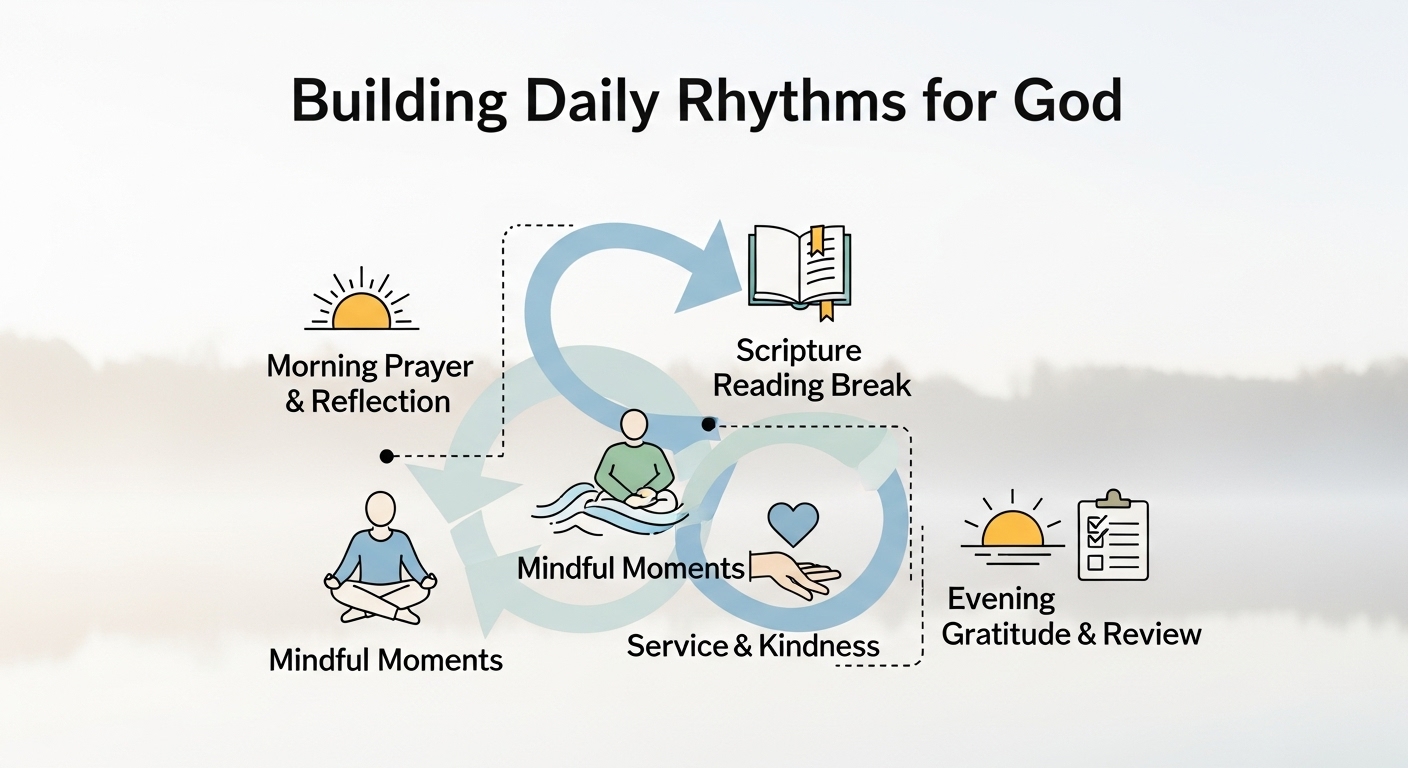How To Make Time For God In A Busy World
You want to live a life that honors God, but the calendar keeps filling up, your phone never stops buzzing, and the days feel like running on a treadmill. Learning how to make time for God in a busy world isn’t about finding a secret hour hidden somewhere—it’s about reorienting your habits, protecting margins, and creating simple, sustainable rhythms that invite God into your day. This article guides you through practical time management tips and spiritual disciplines, helping you establish a daily devotion life that lasts.
Why you should make time for God first
When life is full, it’s tempting to relegate God to the margins—an afterthought between commitments. Yet Scripture invites you to put God first as the priority that shapes everything else. Jesus said, “seek first his kingdom and his righteousness” as the guiding posture of life (Matthew 6:33). When you make time for God, you aren’t adding another task to your to-do list; you’re inviting the One who orders your steps to lead your decisions and give you perspective.
The cost of not making time for God
You’ll notice the cost when you live disconnected from God: decisions made from stress instead of wisdom, weariness masked by productivity, and a sense of aimless movement without spiritual grounding. The psalmist’s exhortation to “be still” points to a heart-level rest that you miss when busyness crowds out time with God (Psalm 46:10). Making time for God preserves your soul, guides your priorities, and recharges your capacity to love others well.
Common obstacles that keep you from making time for God
You’re not lazy or lacking in faith if you struggle—most people face real barriers. Technology, overcommitment, guilt, and unrealistic expectations often appear. Recognizing the specific obstacles in your life helps you design a plan that fits your season.
Technology and constant distraction
Your phone and devices are useful, but they are also attention thieves. Notifications and endless scrolling eat the edges of your day until there’s nothing left for quiet and prayer. The Bible warns you to be careful how you live—making the most of your time (Ephesians 5:15-16). If you’re honest, turning off distractions is one of the most powerful ways to make space for God.
Overcommitting and poor boundaries
Saying “yes” to everything leaves no margin for reflection, worship, or rest. You may need to re-evaluate what you can realistically carry. Wisdom from Proverbs can guide you as you learn to trust God and make room for Him in your plans (Proverbs 3:5-6). Boundaries aren’t unspiritual; they’re a tool to steward your time well.
Guilt, perfectionism, and unrealistic expectations
You might feel guilty that your devotions aren’t long enough or deep enough. That guilt can paralyze you. God doesn’t measure devotion by checklist perfection but by a heart posture of surrender and return (Romans 12:1-2). Grace invites you to start where you are and grow.
The theological reasons to prioritize time with God
Understanding why you make time for God matters as much as the how. Jesus modeled intentional seasons of solitude—He rose early to pray and be with the Father (Mark 1:35). The story of Mary and Martha shows that choosing the presence of Christ over frantic activity matters more than productivity (Luke 10:38-42). When you make time for God, you’re aligning your life with the One who made you.

How to build practical daily rhythms that help you make time for God
Creating sustainable patterns beats sporadic spurts of devotion. Start small, be consistent, and design rhythms that fit your life. Below are practical routines and strategies to help you integrate devotion into your day without turning it into a burdensome project.
Morning routines that actually work
The morning is fertile ground for devotion because your willpower is often highest and the world is quieter. Even five to ten minutes of focused prayer, Scripture reading, and quiet can reframe your day. Jesus’ habit of getting away to pray early is a live example you can emulate (Mark 1:35). You don’t need a perfect hour—consistency matters more than length.
Night routines to close the day well
Evenings are an opportunity to reflect and hand the day back to God. A short liturgy of gratitude—naming three things you’re thankful for, confessing where you missed the mark, and committing tomorrow to God—builds spiritual momentum. A restful conclusion matters; “In peace I will lie down and sleep” reflects trust that God holds you (Psalm 4:8).
Micro-devotions you can do in five minutes
You don’t need large blocks of time to make time for God. Micro-devotions—one verse, a quick prayer, a breath-focused meditation—are powerful. A brief pause between meetings or while waiting in line can be a “mini altar” where you recenter your heart toward God. Small, consistent acts compound into deeper devotion.
Sabbath and intentional weekly rest
A weekly rhythm of rest is part of God’s design; keeping a Sabbath helps you step back, worship, and restore (Exodus 20:8). You might not call it Sunday—you might pick a day that works—yet the point is the same: create undistracted time to be with God and with the people you love.
Use technology intentionally, not defensively
Tech can help you make time for God if you set it up that way. Use Bible apps with daily reading plans, set reminders for prayer, and keep a short worship playlist for transitions. Conversely, schedule times to be off social media and silence notifications. Your devices can become allies when you train them to serve your spiritual life rather than sabotage it.
Prayer rhythms that keep you connected
Prayer doesn’t have to be a monologue; it can be a rhythm of listening and speaking. Jesus taught about private prayer, emphasizing a personal posture of connection (Matthew 6:6). You’ll deepen your life with God when you mix gratitude, confession, intercession, and listening throughout the day.
Practical Bible reading strategies
Reading Scripture doesn’t have to be overwhelming. Start with short passages, use devotionals that connect passages to everyday life, or follow a chronological reading plan. Let the Word illuminate the streets where you live—Psalm 119 calls Scripture a lamp to your feet and a light for your path (Psalm 119:105). Quality matters more than quantity; aim to be formed by the text, not just informed by it.
Quick, practical tips to make time for God (short list)
- Protect first things: schedule devotion before other commitments.
- Use habit stacking: attach prayer to an existing habit like brushing your teeth.
- Keep a simple plan: one Psalm, one Gospel reading, and five minutes of prayer, for example.
- Use transitions: commute, coffee break, or waiting time can be devotion time.

Time management techniques that help you make time for God
You can borrow productivity tools from secular time management and repurpose them to guard sacred time. These techniques help you build sustainable margins and reduce the friction that keeps you from devotion.
Time blocking: schedule God into your calendar
Treat your devotional time like an important appointment. Block it on your calendar and protect it. When you schedule time to make time for God, you signal to yourself and others that this is non-negotiable.
Habit stacking: pair new spiritual habits with existing routines
Attach a spiritual practice to something you already do—pray after your morning coffee, read a verse after lunch, praise during your evening commute. Habit stacking makes devotion easier by reducing the need for extra decision-making.
Saying “no” gracefully to preserve space
You can’t do everything. Learning to say “no” with grace creates room to say “yes” to what truly matters. Saying no to busyness makes room to make time for God and for the relationships He’s entrusted to you.
Delegation and simplification
Delegate responsibilities where you can and intentionally simplify your commitments. Less clutter means fewer distractions and more bandwidth for spiritual formation. Simplicity is a spiritual discipline as much as it is a practical strategy.
Spiritual disciplines that deepen your devotion
Practical routines shape your heart over time. Spiritual disciplines are not rules to impress God—they are practices that form your soul into the likeness of Christ. You’ll find that disciplines create pace and depth.
Meditation and silence: the discipline of listening
Silence is hard in a noisy world, but it’s where you hear God’s voice. The psalmist’s command to “be still” invites you into posture and presence (Psalm 46:10). Even a few minutes of quiet meditation each day can transform how you respond to stress and hurry.
Journaling and reflective prayer
Writing helps you track spiritual growth, confess patterns, and remember answers to prayer. Reflection prompts like “Where did I see God today?” or “What do I need to surrender?” move your devotion from abstract to concrete and create a record God can use to encourage you later.
Fasting: recalibrating appetite and attention
Fasting helps you reorient your desires and heighten dependence on God. Jesus talked about fasting as a private discipline that focuses hunger toward God rather than public approval (Matthew 6:16-18). Consider fasting from food, social media, or entertainment to make spiritual space.
Community and accountability
You weren’t made to do this alone. Spiritual growth flourishes in community. Hebrews encourages believers to spur one another on toward love and good deeds and not to neglect meeting together (Hebrews 10:24-25). Find a friend, mentor, or small group that helps you stay consistent.
How to make time for God when life is chaotic: seasonal strategies
Life ebbs and flows. Babies, new jobs, caregiving—seasons demand different rhythms. You don’t have to abandon spiritual life when seasons shift; you can adapt your practices to fit.
Short season strategies
If you’re in a short, intensely busy period, scale down to micro practices: one sentence prayer, one verse bookmarked, five minutes of reflection. These practices keep a door open to God even when large blocks of time are impossible.
Long season strategies
In long seasons of constraint, intentionally build weekly anchors—Sabbath, a regular fellowship meeting, or a longer Sunday reflection—that sustain you. The goal is consistency over heroic efforts.

Making God part of your work and family life
You don’t have to separate sacred and secular. Integrate what you worship into how you work and how you love.
Bring intentional prayer into your work
Offer your work to God as worship. Scripture teaches that whatever you do, work at it with all your heart as working for the Lord (Colossians 3:23-24). Short pauses to pray for coworkers, or to ask God for wisdom before a meeting, stitch the spiritual into your day.
Family devotions and rhythm
If you have a family, creating simple shared practices—mealtime prayers, bedtime Bible stories, or a weekly family reflection—teaches the next generation how to make time for God. Small, repeated practices matter more than elaborate programs.
Modeling faith with your life
Your kids or coworkers will watch how you live more than listen to what you say. Living a life where God is a priority teaches more than any formal lesson. Be honest about struggles but consistent about practice.
Overcoming setbacks and staying consistent
You will stumble. Missed days are not failures but opportunities for mercy and return. Paul encourages transformation through renewing your mind—spiritual growth is a process, not a single event (Romans 12:1-2). When you fall off rhythm, repent, re-evaluate, and start again.
Using hope and endurance
When discouragement hits, remember that endurance and faithfulness are sustained by hope in God, not by your perfection. Isaiah promises renewed strength for those who wait on the Lord (Isaiah 40:31). Let hope fuel your return.
Measuring spiritual progress without legalism
It’s easy to turn devotion into a list of accomplishments. Instead of tallying tasks, look for fruit: love, patience, kindness, self-control—evidence that God is at work in you (Galatians 5:22-23). Use progress markers like increased compassion, decreased anxiety, or a deeper sense of peace rather than time logged.
Real-life examples you can relate to
Maybe you’re a parent who prays during a toddler’s nap, a commuter who reads Scripture on the train, or a night-shift worker who finds quiet at 3 a.m. These small adaptations are real ways people make time for God despite constraints. The important thing is to find rhythms that work in your context—not someone else’s ideal routine.
How to create a personalized plan to make time for God
Design a plan that fits your unique life, then test and adjust. Here’s a simple framework you can personalize:
- Identify a primary time: pick a time of day you can consistently protect for devotion.
- Choose three simple practices: for example, a short Bible reading, five minutes of prayer, and a gratitude list.
- Stack to an existing habit: attach the new practice to brushing your teeth, morning coffee, or commuting.
- Schedule it: block it on your calendar and treat it like an appointment.
- Add weekly anchors: a Sabbath, a longer study time, or a small group meeting for accountability.
- Review monthly: reflect on what’s working and tweak the plan.
This simple structure helps you make time for God without adding unnecessary complexity.

Short sample routines you can try this week
- 5-minute morning: Read one Psalm verse, pray for three people, breathe for one minute.
- Micro-breaks: Two one-minute prayers at mid-morning and mid-afternoon, thanking God for your work.
- Evening ritual: Name three things you saw God do today, ask forgiveness for one thing, and entrust tomorrow to God.
- Weekly anchor: 30 minutes on Sunday for deeper Scripture study and reflection.
These samples are designed to be sustainable and flexible. Start with the smallest one and build from there.
When to seek help or accountability
If you find repeated resistance or spiritual dryness, don’t go it alone. Invite a trusted friend, mentor, or pastor into your struggle. Hebrews highlights the importance of mutual encouragement (Hebrews 10:24-25). Accountability helps you stay honest and receive encouragement.
The long game: making time for God over decades
Spiritual life is not about sprinting; it’s a marathon of small faithful choices. Learning to pace yourself and prioritize what matters will pay long-term dividends. Psalm 90 teaches you to number your days and live with wisdom (Psalm 90:12). Over decades, consistent small practices shape a life that reflects God’s character.
How hope fuels the habit of devotion
When you make time for God, you’re not performing for results but responding to the promise of a relationship. Jeremiah reminds you that when you seek God with all your heart, you will find Him (Jeremiah 29:13). Let that promise be the anchor—devotion is about seeking, receiving, and being transformed.
Practical pitfalls to avoid
Be wary of legalism, self-reliance, and comparing your inner life to someone else’s highlight reel. Avoid metrics that turn devotion into a competition. Instead, return often to God’s grace and the simple call to love and follow Him.
Final encouragement to help you begin
If you want to make time for God, start with one small step today. Decide on a five-minute pause, pick a verse, and talk to God about your desire to know Him. Remember, Mary choosing the “better part” by sitting with Jesus; you don’t need to earn His presence—you simply need to come and stay (Luke 10:38-42). Over time, the small choices will reshape your heart and your calendar.
Closing prayer you can use right now
You can pray with honesty: “God, I want to make time for You in the mess of my days. Help me start small, stay consistent, and grow in love. Guide my steps and give me wisdom to set healthy boundaries.” Speaking simple prayers keeps your heart oriented toward God and invites Him into the practical work of change.
Final practical checklist
- Block a daily devotional time on your calendar this week.
- Choose one Bible passage or short devotional plan to follow.
- Turn off notifications during that time.
- Find one accountability partner to check in weekly.
- Plan a weekly Sabbath or rest period.
These steps are meant to be a beginning, not a burden. Keep the plan flexible and merciful.
Parting word of hope
Learning to make time for God is less about adding tasks and more about realigning your life. You’re not seeking a perfect routine—you’re seeking a deepening relationship. Let grace guide your efforts. As you choose God, He will meet you there and lead you forward.
Explore More
For further reading and encouragement, check out these posts:
👉 7 Bible Verses About Faith in Hard Times
👉 Job’s Faith: What We Can Learn From His Trials
👉 How To Trust God When Everything Falls Apart
👉 Why God Allows Suffering – A Biblical Perspective
👉 Faith Over Fear: How To Stand Strong In Uncertain Seasons
👉 How To Encourage Someone Struggling With Their Faith
👉 5 Prayers for Strength When You’re Feeling Weak

📘 Jesus and the Woman Caught in Adultery – Grace and Mercy Over Judgement
A powerful retelling of John 8:1-11. This book brings to life the depth of forgiveness, mercy, and God’s unwavering love.
👉 Check it now on Amazon 🛒💥
🔥 “Every great message deserves a home online.” 🌍💬🏡
Don’t let your calling stay hidden. Start a Christian blog or website using Hostinger — with 99.9% uptime, a free domain, and SSL, your voice can shine for God’s glory anytime, anywhere.
💥 Begin today. 🛒 Try it RISK-FREE! ✅
✝️ “Your body is God’s temple — care for it with purpose.” 💪💖🏛️
Renew your energy and restore balance naturally. Mitolyn helps support a healthy metabolism, giving you the vitality to live out God’s calling with strength and confidence.
🔥 Unlock Your Metabolic Power! ⚡Burn More Calories & Feel Great With Mitolyn. 💪
👉 Start Today. 🚀 Check Price Now. 🛒💰
💰 As a ClickBank & Amazon Affiliate, I earn from qualifying purchases.
📖 Acknowledgment: All Bible verses referenced in this article were accessed via Bible Gateway (or Bible Hub).
🚀 Want to explore more? 👉 Dive into our new post on Why Jesus? and experience the 🔥 life-changing truth of the Gospel!







